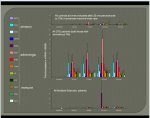Some Dog Drool
PEM or Post-Exertional Malaise or Fatigue is over and above what we experience on a daily basis. It is caused when we cross that arbitrary "envelope" the defines what our bodies can handle and seems directly or indirectly related to cardiac function on any given day or at any given time.
For instance you may be able to walk a nice slow 1/2 mile on a particular day with no ill effects later in the day or the following day. However if you take the same walk the next day you may notice a "crash" or a much higher level of pain, fatigue, more rapid heart rate or general flu like feeling.
There is considerable documentation regarding this particular phenomenon in ME/CFS (see below) It is a unique hallmark to the illness and doesn't occur in quite the same way anywhere else.
1-(Carruthers et al 2003) otherwise known as the Canadian Consensus criteria was the first to Incorporated the PEM symptom as a diagnostic criteria.
Quote : The malaise that follows exertion is difficult to describe but is often reported to be similar to the generalized pain, discomfort and fatigue associated with the acute phase of influenza. Delayed malaise and fatigue may be associated with signs of immune activation: sore throat, lymph glandular tenderness and/or swelling, general malaise, increased pain or cognitive fog. Fatigue immediately following activity may also be associated with these signs of immune activation. Patients who develop ME/CFS often lose the natural antidepressant effect of exercise, feeling worse after exercise rather than better. Patients may have a drop in body temperature with exercise. Thus fatigue is correlated with other symptoms, often in a sequence that is unique to each patient. After relatively normal physical or intellectual exertion, a patient may take an inordinate amount of time to regain her/his pre-exertion level of function and competence. For example, a patient who has bought a few groceries may be too exhausted to unpack them until the next day. The reactive
fatigue of post-exertional malaise or lack of endurance usually lasts 24 hours or more and is often associated with impairment of cognitive functions. There is often delayed reactivity following exertion, with the onset the next day, or even later. However, duration of symptoms also
varies with the context. For example, patients who have already modified their activities to better coincide with the activity level they can handle without becoming overly fatigued will be expected to have a shorter recovery period than those who do not pace themselves adequately.
The Dr.s Light have probably done the most significant work in this area but they have built on some great work over the years as well.However if I understand correctly they have patented a test that can be used after an exercise test to prove a specific cytokine signature so their work is unpublished at this point while all the legal aspects are set up.
However there is the work of Vermeulen et al 2010,
Patients with CFS performed worse than controls in a controlled repeated exercise study despite a normal oxidative phosphorylation capacity.
Quote:RESULTS: At both exercise tests the patients reached the anaerobic threshold and the maximal exercise at a much lower oxygen consumption than the controls and this worsened in the second test. This implies an increase of lactate, the product of anaerobic glycolysis, and a decrease of the mitochondrial ATP production in the patients. In the past this was also found in patients with defects in the mitochondrial oxidative phosphorylation. However the oxidative phosphorylation in PBMC was similar in CFS/ME patients and controls. The plasma creatine kinase levels before and 24 h after exercise were low in patients and controls, suggesting normality of the muscular mitochondrial oxidative phosphorylation.
CONCLUSION: The decrease in mitochondrial ATP synthesis in the CFS/ME patients is not caused by a defect in the enzyme complexes catalyzing oxidative phosphorylation, but in another factor.
Another is the
Nitic oxide metabolite production during exercise in CFS by Suarez et al 2010 which found
RESULTS: Plasma nitrates differed between the groups, with higher values in the CFS group (F = 6.93, p = 0.003). Nitrate concentration increased in relation to workload and reached higher values in the CFS group, the maximum difference with respect to the control group being 295% (t = 4.88, p < 0.001).
CONCLUSIONS: The main result of the present study is that nitric oxide (NO) metabolites (nitrates) showed a much higher increase after a maximal physical test in CFS patients than in a group of matched subjects. This combination (exercise plus NO response evaluation) may be useful in the assessment of CFS.
For every study on Pub Med that shows an abnormality in ME/CFS patients, and all the scientific study's do show an abnormality, there are an equal number of psychological studies that show some time of perceived improvement from a psychological perspective. This could be manipulation of data or different cohorts or what ever.
My advice would be as follows. Print out each of the abstracts of biomedical exercise intolerance, use a highlighter to highlight the results which all show an abnormality and take them with you. Be dramatic and lay them out side by side by side. (big grin) And then hope your NHS person isn't one of those who ignores whats right in front of her face. Good luck and I'll put paws together that it works out for you.
 Would be very grateful for references/links to any academic papers, including the latest systematic review the NHS is basing its training of personnel on.
Would be very grateful for references/links to any academic papers, including the latest systematic review the NHS is basing its training of personnel on.
